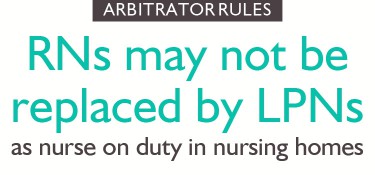RNs may not be replaced by LPNs as nurse on duty in nursing homes, arbitrator rules
A ruling by Arbitrator David Jones in a dispute between United Nurses of Alberta and an Edmonton nursing home operator has upheld the union’s interpretation of the Nursing Homes Operation Regulation, which requires such facilities to have a Registered Nurse, Certified Graduate Nurse or Registered Psychiatric Nurse on the premises 24/7.
Since Licensed Practical Nurses are not defined as “nurses” in the Regulation to the Nursing Home Act, Jones said, an LPN may not replace the on-site duty nurse.
“Residents in Nursing Homes will continue to have the expertise of RN care 24/7,” said UNA Labour Relations Officer Shaun Emes, who presented the union’s arguments. “An RN must be on site at all times.”
The dispute arose from the interpretation by the employer, the Edmonton Chinatown Care Centre, that the Nursing Homes Operation Regulation permitted the employer to replace an RN with an LPN if no RN was available and if an RN, usually a manager, could be on call at another location.
This situation arose 10 times between August 20, 2014, and November 2, 2015, and UNA filed grievances on each occasion that argued the employer’s actions broke both the law’s regulation and UNA’s collective agreement with ECCC, which has similar wording to the regulation.
Representatives for the employer supported their position by quoting previous ministers of health, who in the last years of the Progressive Conservative government had indicated to them the relevant section of the Regulation could be interpreted to permit use of LPNs in such circumstances.
In his June 30 ruling, Jones noted that different ministers of health at different times adopted differing interpretations of the regulation. “Earlier ministerial correspondence appears to be consistent with the employer’s interpretation,” he noted. “In August 2015, the current minister adopted the union’s interpretation.”
However, he noted after hearing arguments from Emes that “a third party’s interpretation is irrelevant, even if that interpretation comes from a minister.”
Emes argued the core issue in the arbitration was the proper interpretation of Section 14(1) of the Regulation. The union took the position the regulation states clearly a “nurse” as defined by the Regulation must be on duty at all times, and that the definition is restricted to a Registered Nurse, Certified Graduate Nurse or Registered Psychiatric Nurse. Since ECCC employed no Certified Graduate Nurses or RPNs, that limited the employer’s option to an RN.
In his arguments, Emes also rejected the employer’s claim its use of LPNs was protected by past practice because the union had immediately grieved the practice after negotiating a first collective agreement, and because the legal doctrine may not be applied when a practice is illegal.
In his decision, Jones agreed with UNA’s position that the Regulation strictly defines nurse, and when that definition is applied to the section in question “this provision can only be interpreted as requiring there be at least one Registered Nurse, Certified Graduate Nurse or Registered Psychiatric Nurse on duty at all times in the nursing home.”
“It does not permit any other type of person (such as an LPN) to be the required person on duty,” he said.
So, he concluded, it doesn’t matter if the employer thought it was OK to have an RN or other qualified nurse on call somewhere else, that is not what the regulation says. If the definition of “nurse” in the Regulation does not meet current practice, he added, “that judgment is for the government, not an arbitrator.”
Nor could the grievances be dismissed on the grounds of past practice, he said, because the past practice was illegal, he said.
“Accordingly, I declare that the employer has breached the collective agreement by not having at least one Registered Nurse … on site on the 10 occasions at issue in the arbitration.”

